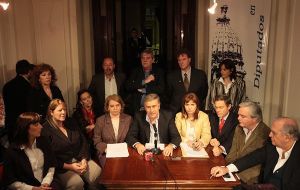MercoPress. South Atlantic News Agency
Argentine ‘non official’ February inflation: 1.65% and 22.75% in twelve months
 Opposition lawmakers announcing the February inflation rate
Opposition lawmakers announcing the February inflation rate February inflation in Argentina according to an average of private agencies which is released monthly by members of the Congressional opposition was 1.65%, climbing to 22.75% in the last twelve months. The official Indec inflation is scheduled to be released next March 13.
Argentine opposition lawmakers every month release an average of private consultants’ consumer prices index estimates, since the Domestic Trade Secretariat has threatened those organizations with fines of up to 150.000 dollars if they make public their reports.
Since the Argentine Stats office Indec five years ago, under former president Nestor Kirchner, had its professional staff removed and replaced by political cronies, the gap between the two indexes has soared: while the official Indec 12-month percentage is below two digits, the so called Congressional index has always been in the twenties.
Lawmaker Ricardo Gil Lavedra said that “inflation exists even when the government tries to erase reality and the legal system”, in reference to the ban on making public private consultants estimates.
Another lawmaker, Paula Maria Bertol underlined that the Indec numbers do not reflect reality “and we will continue making public the index from public consultants because it is a question of freedom of expression and the people’s interest and right to know”.
She added that inflation continues to erode the competitive (export) dollar of the first years of the Kirchner couple and this is clearly reflected in the outflow of capital. It also means less investment and less jobs for the Argentines”.
Nevertheless Gil Lavedra added that the February index was below the 1.7% of January, particularly since summer and holiday months tend to be less prices yield, “but we can expect a strong surge in March which is the beginning of the school year with all the spending for the new school year”.
In the last six months the Congressional index showed the following inflation percentages: January, 1.7%; December, 1.9%; November, 1.4%; October, 1.5%; September, 1.9% and August, 1.9%. But for Indec the figures were as follows: 0.7%; 0.8%; 0.6%; 0.6%; 0.8% and 0.8%.
The Indec inflation for 2011 was 9.5% while the Congressional index, 22.8%.




Top Comments
Disclaimer & comment rules-

-

-

Read all commentsChuckle chuckle. Talk about shoot the messenger.
Mar 09th, 2012 - 06:47 am 0Why do the good people of Argentina put up with this sort of incompetence?
Since the Argentine Stats office Indec five years ago, under former president Nestor Kirchner, had its professional staff removed and replaced by political cronies, the gap between the two indexes has soared: while the official Indec 12-month percentage is below two digits, the so called Congressional index has always been in the twenties.
22% is still under the 27-30% most have been predicting for a couple of years.
Mar 09th, 2012 - 07:54 am 0China and Brazil have slowed significantly, so that may be playing a role. Argentina's economy was cooled down by the United States economic crisis in 2009, which allowed the last two years of strong growth based on consumer stimulus. Now if China and Brazil slow down hard, they can slow down Argentina without CFK being either forced to do it or just boing past the boiling point.
So ironically, the slowdown elsewhere in the world could be beneficial for Argentina in the medium term beyond the short-term slump in exports that brings. It may allow yet again, another year of two of growth without inflation really becoming fatal.
Anyone surprised? Although what does surprise me is many posters on here openly support CFK even though she blatantly lies to them, the UN, the EU and pretty much every global body including the IMF.
Mar 09th, 2012 - 08:04 am 0I wonder what will happen when the IMF's 180 days are up to get real about the figures? (Probably nothing would be my guess with the IMF).
Commenting for this story is now closed.
If you have a Facebook account, become a fan and comment on our Facebook Page!